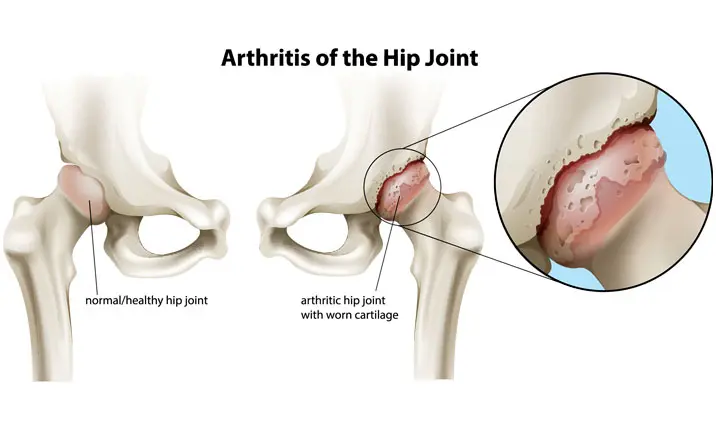What is arthritis?
Arthritis refers to inflammation of the joint, resulting in pain, swelling, stiffness and loss of the joint function. Arthritis can occur in any joint of the body but most often develops in weight-bearing joints such as the hips and knees. Two of the most common types of arthritis that affect the hip are osteoarthritis, rheumatoid arthritis and avascular necrosis.
Regardless of the cause, symptoms such as joint pain, swelling and stiffness usually progress over time and worsen with age. While arthritis is more common in adults over the age of 65, it can also develop in children, teenagers, and young adults. When left untreated, arthritis may cause serious disabilities that will reduce the overall quality of life. Patients suffering from severe hip arthritis may find it difficult to perform simple daily activities such as walking, bending over, tying shoelaces, cutting toenails or getting in and out of a car.
What types of arthritis affect the hips?
There are over 100 types of arthritis, but there are 3 main types that most commonly affect the hip. Your treatment will depend on the type of arthritis you have.
Osteoarthritis (OA)
Osteoarthritis is the most common form of arthritis. The smooth cartilage that cushions your joints wears away gradually, causing friction, pain, inflammation and eventual damage to the bones. The normal hip is a ball-and-socket joint lined with smooth cartilage that allows the joint to move and rotate easily. If the smooth cartilage wears away, the rough surfaces of the ball-and-socket start to grind against each other, limiting movement and causing pain. Over time, osteoarthritis will worsen or permanently damage the structure of the joint.
Rheumatoid arthritis (RA)
Another common form of arthritis is rheumatoid arthritis, which affects the entire body and not just the hip. Rheumatoid arthritis is related to an immune system response rather than wear and tear like with osteoarthritis. This type of arthritis causes swelling and inflammation of the joint capsule synovial lining, eventually destroying the joint. Unlike osteoarthritis, which tends to occur only in one hip, rheumatoid arthritis typically occurs in both hips at the same time (and possibly other joints).
Avascular Necrosis (AVN)
While less commonly known, avascular necrosis (AVN) is one of the prevalent causes of hip arthritis in Singapore and Asia. AVN is a condition that results from the death of bone tissue due to a loss of blood supply. The femoral head, part of the hip joint, is the most common body part affected by this condition. If left untreated, the affected bone may eventually collapse from the formation of tiny breaks. This condition is often caused by injuries to the hip joint, overconsumption of alcohol, or prolonged and excessive use of steroids (often for treatment of medical conditions).
What causes hip arthritis?
The causes of hip arthritis are currently unknown, but there are certain factors that may increase your risk for this condition. These include:
- Advanced age
- Excessive alcohol consumption
- Genetics
- Long term steroid usage
- Obesity or being overweight
- Previous damage/ injury or fractures to the hip
- Repeated stress on the joints through activities that involve the hip such as sports
What are the symptoms of hip arthritis?
Regardless of the type of hip arthritis you may have, the symptoms are:
- A sound or a crunching feeling of bone rubbing against bone
- A "swaying" gait when you walk (the body tends to swing side to side)
- Pain in the hip joint that may include pain in the groin, outer thigh, or sometimes buttocks
- Pain in the hip joint worsens with strenuous or extended activity
- Shortening of the affected limb due to damage of the bones
- Stiffness/difficulty or inability to move the hip to perform daily activities such as bending over to tie your shoelaces
How is hip arthritis diagnosed?
Hip arthritis can be diagnosed with X-rays in the advanced stage. Magnetic resonance imaging (MRI) scans may be needed in the early stages when the X-ray findings are not obvious. The X-ray will reveal a narrowing space between the bones in your joint and the spurring of joint margins, and in severe cases, total destruction of the hip joint with limb shortening.
During your physical examination, your orthopaedic surgeon will ask about your medical history and symptoms, and perform a physical examination. This will include checking the range of motion in your hip to determine its level of functionality, as well as a measurement of the limb length.
How is hip arthritis treated and managed?
There is currently no medication that can cure hip arthritis, but there are treatment options available that can help improve your mobility and quality of life. The goal of these treatments involves improving the function of the hip and managing the pain.
Treatments for hip arthritis include:
- Exercising and losing excess weight
- Hip replacement surgery
- Pain medication such as paracetamol, diclofenac (a non-steroidal anti-inflammatory drug), or Celebrex/Arcoxia (COX II inhibitors)
- Physical therapy to help increase the range of motion in your hip
- Rest and joint care
- Use of assistive devices such as canes to help take weight off the affected hip
Should you consider hip replacement surgery?
Hip replacement surgery is a procedure in which the arthritic and damaged hip joint is replaced with an artificial joint made of metal/ceramic materials, with a special plastic (polyethylene) layer in between to act as the new cartilage. A successfully replaced hip joint will relieve arthritic pain, restore function of the hip, and lengthen the shortened limb. Hip replacement is a good option for those suffering from severe hip arthritis, with significantly reduced quality of life.
You should consider hip replacement surgery if:
- Non-surgical treatments such as pain medication, anti-inflammatory drugs, physical therapy, exercise, or weight loss are no longer able to provide relief
- You are taking excessive pain medication, experiencing side effects such as gastric erosion or kidney damage
- Daily life has become increasingly difficult, and it has become too painful for you to perform daily activities such as walking, standing up or sitting down, bending over or climbing stairs
- You experience hip pain even when you're not moving
- You are unable to sleep or rest well due to the hip pain
- Your mental health has been compromised due to your condition, causing you to feel anxious or depressed
While complications from hip replacement surgery are generally minor, it's important to know the risks involved:
- Bleeding
- Blood clots
- Heart attack
- Hip dislocation
- Infection
- Injury to nerves
- Other problems that may be caused by general anaesthesia
While hip replacement surgery has its merits, it's important to note that a replacement hip doesn't last forever (15 – 20 years on average) and you may need follow-up procedures. Full recovery from the surgery will also take anywhere between 6 – 12 months, and while you will most likely be pain-free after a successful hip replacement surgery, physiotherapy will be required after surgery to help you walk better and learn to move with your new hip.
If you are experiencing symptoms of hip arthritis, it is recommended to consult an orthopaedic specialist to evaluate your condition and discuss your treatment options. Starting treatment as soon as possible can help improve your outlook and eliminate the need for surgery.















